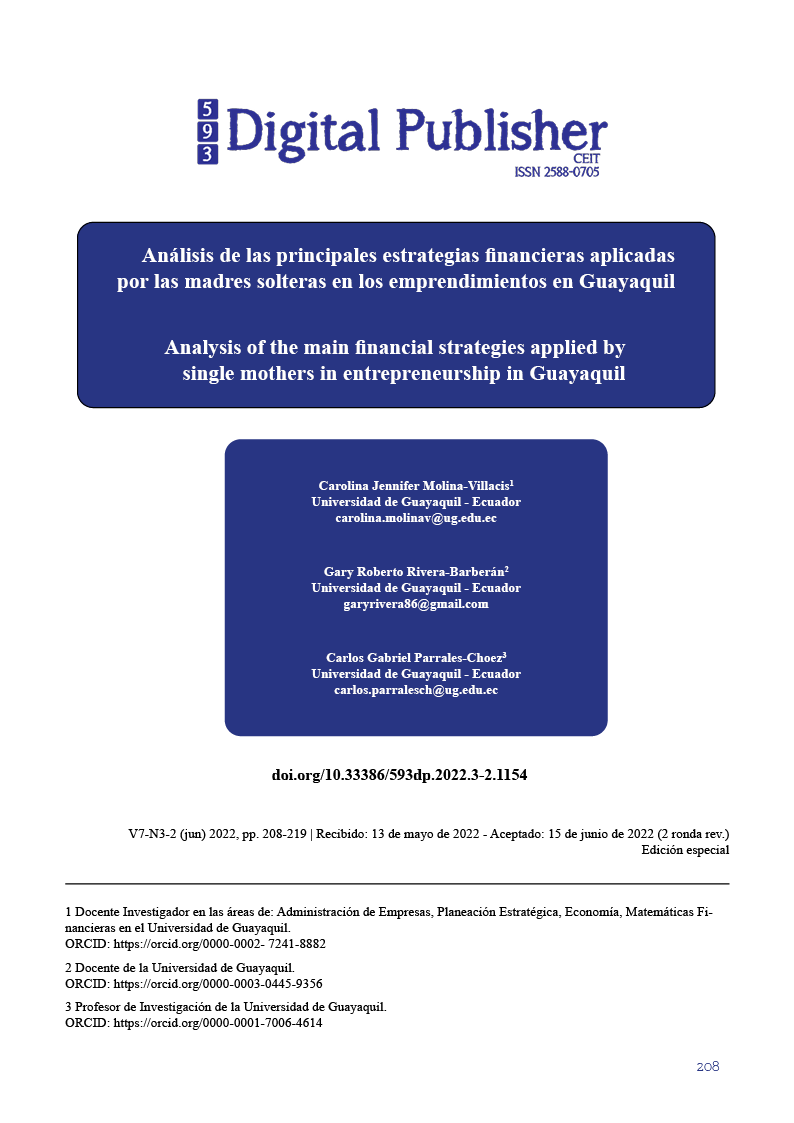Analysis of the main financial strategies applied by single mothers in entrepreneurship in Guayaquil
Main Article Content
Abstract
The ventures turn out to be initiatives of people who in one way or another have a business idea and implement it, generally moved by the economic need of the moment, however, it is not the only way or way in which these initiatives arise, for this investigation. An analysis is carried out on the different financial strategies used by single mothers in their enterprises in the city of Guayaquil. The issue is undoubtedly important since the emergence of this type of business driven by women who, in one way or another, are at the forefront of sustaining the family economy are becoming more and more frequent. There are multiple factors that affect a woman being alone and with children doing the work of being the one who takes the reins of her home, but it is important to know the financial strategies that these women implement to promote, grow and above all maintain this type of business. Due to their characteristics, they are small businesses that come to be the lifeline of many families, who, unable to enter full-time and better paid jobs, these mothers are forced to invent a way to obtain money to cover their own expenses. from a family. The methodology used is of a bibliographic documentary type, carrying out a review of the different works and scientific publications in this regard. It is concluded that the main strategies used are financial education and access to credits that allow financing.
Downloads
Article Details

This work is licensed under a Creative Commons Attribution-NonCommercial-ShareAlike 4.0 International License.
1. Derechos de autor
Las obras que se publican en 593 Digital Publisher CEIT están sujetas a los siguientes términos:
1.1. 593 Digital Publisher CEIT, conserva los derechos patrimoniales (copyright) de las obras publicadas, favorece y permite la reutilización de las mismas bajo la licencia Licencia Creative Commons 4.0 de Reconocimiento-NoComercial-CompartirIgual 4.0, por lo cual se pueden copiar, usar, difundir, transmitir y exponer públicamente, siempre que:
1.1.a. Se cite la autoría y fuente original de su publicación (revista, editorial, URL).
1.1.b. No se usen para fines comerciales u onerosos.
1.1.c. Se mencione la existencia y especificaciones de esta licencia de uso.
References
Baque, L. (2019). Vinculación de Uniandes - Quevedo y su Impacto en el Desarrollo de Emprendimientos en la Provincia de Los Ríos. Centros. Revista Cientifica Universitaria, 66-74. Obtenido de http://up-rid.up.ac.pa/2193/1/913
Baque, L., Viteri, D., Álvarez, L., & Izquierdo, A. (2020). Plan de negocio para emprendimientos de los actores y organizaciones de economía popular y solidaria. Revista Universidad y Sociedad, 12(4), 120-125. Obtenido de https://rus.ucf.edu.cu/index.php/rus/article/view/1621
Comision Interamericana de Mujeres, CIM. (2020). Covid-19 en la vida de las mujeres. Recuperado el 30 de Abril de 2022, de Razones para reconocer los impactos diferenciados: https://www.oas.org/es/cim/docs/ArgumentarioCOVID19-ES.pdf
Corporacion Financiera Nacional del Ecuador, CFN. (2017). Emprendedores y emprendimiento. Recuperado el 30 de Abril de 2020, de https://es.scribd.com/document/460579503/2-roberto-santacruz-emprendedores-y-emprendimiento-2017
Cotera, E., Zavala, M., Rodriguez, M., & Chavarria, E. (2019). La educación como estrategia para la toma de decisiones en las pequeñas empresas. Academia Journals 2019, 521-683. Obtenido de https://static1.squarespace.com/static/55564587e4b0d1d3fb1eda6b/t/6008590368c1fd1312dd7049/1611159818915/Investigaci%C3%B3n+en+la+Educaci%C3%B3n+Superior+Morelia+2019+-+Academia+Journals+-+Tomo+04.pdf
Herruzo-Gómez, E., Hernández-Sánchez, B., Cardella, G., & Sánchez-García, J. (2019). Emprendimiento e innovación: oportunidades para todos. Madrid: Editorial DYKINSON, S.L. Obtenido de https://www.researchgate.net/profile/Jesus-Garcia-Rojas/publication/348083473_Formacion_academica_e_iniciativa_emprendedora_de_los_estudiantes_de_educacion_superior_tecnologica/links/604562424585154e8c83bf6d/Formacion-academica-e-iniciativa-emprendedora-d
Instituto Nacional de las Mujeres, INMUJERES. (Octubre de 2021). Madres Solteras. Recuperado el 30 de Abril de 2022, de http://estadistica.inmujeres.gob.mx/formas/tarjetas/Madres_solteras.pdf
Martelo, Z., Villabona, N., & Franco, D. (2019). Estrategias que apoyan el emprendimiento y el crecimiento sostenible. Revista Aglala, 10(1), 67-86. Obtenido de https://doi.org/10.22519/22157360.1338
Mejia, O., Proaño, M., & Murillo, E. (2020). Características del perfil emprendedor de las madres solteras del noroeste de la ciudad de Guayaquil. Revista Investigación y Negocios, 13(21). doi:https://doi.org/10.38147/inv&neg.v13i21.86
Mendoza, G., & Salvador, A. (2021). Los Mercados Financieros como Mecanismos de Apalancamiento de los Emprendimientos de las Madres Solteras, caso Guayaquil Período 2019-2020. Universidad de Guayaquil. Guayaquil: Trabajo de titulación presentado para optar por el título de Ingeniería en Tributación y Finanzas. Obtenido de http://repositorio.ug.edu.ec/handle/redug/55599
Muñoz, C. (2017). Capacitación laboral para la autonomía económica de mujeres en situación de pobreza. El caso de Chile. Santiago de Chile : CEPAL. Naciones Unidas. Obtenido de CEPAL: http://www.scielo.org.bo/scielo.php?script=sci_nlinks&ref=964074&pid=S2521-2737202000010000900013&lng=es
Vaca, I. (2019). Oportunidades y desafíos para la autonomía de las mujeres e el futuro escenario del trabajo. Comisión Económica para América Latina y el Caribe (CEPAL). Obtenido de https://repositorio.cepal.org/bitstream/handle/11362/44408/4/S1801209_es.pdf
Vasquez, W. (2020). Universidad de San Martin de Porras. Obtenido de https://www.usmp.edu.pe/estudiosgenerales/pdf/2020-I/MANUALES/II%20CICLO/METODOLOGIA%20DE%20INVESTIGACION.pdf
Villamar, M. (2020). Factores que Inciden en el Fracaso de Emprendimientos en la Ciudad de Daule-Cabecera Cantonal. Universidad Católica Salesiana. Guayaquil: Articulo Academico Previo a la Obtencion del titulo de Ingeniera Comercial. Obtenido de http://dspace.ups.edu.ec/handle/123456789/19546
Zamora-Boza, C. (2018). La importancia del emprendimiento en la economía: el caso de Ecuador. Revista Espacios, 39(07), 15. Obtenido de https://w.revistaespacios.com/a18v39n07/a18v39n07p15.pdf




